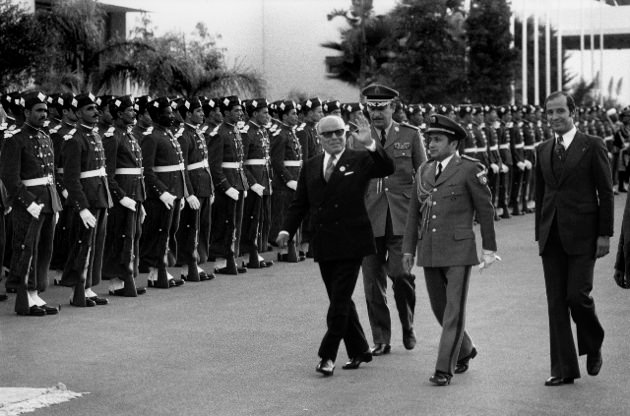Dictators do not usually die in bed. Successful retirement is always a problem for them, and not all solve it. It is a problem for everybody else when they leave. What’s to be done afterwards? The popular uprising that overturned the dictatorial Zein el-Abedine Ben Ali regime in Tunisia last week sent a thrill of hope through Arab populations, or at least to Arab democrats.
But aside from the exceptional and complex case of Lebanon, Arab nations have since the demise of the Ottoman Empire mostly suffered from European quasi-empire, exploitative military and party dictatorships, and recently, hereditary family dictatorships, a reversion to absolute monarchy in secular guise. The dream of a united independent Arab nation to replace the Ottomans was destroyed by World War I peace settlements, which left the major Arab peoples in European mandates under the League of Nations.
The deposed Tunisian president Ben Ali spent the first part of his career as a promising young army officer. This led him into intelligence and security, always a highway to success in the contemporary Arab world. He attended courses at Saint-Cyr in France and the American Army Intelligence School at Fort Holabird in Maryland. His 1987 succession to the Tunisian presidency—in the “medical coup” that occurred when Habib Bourguiba, the republic’s founder (in 1957) become president-for-life, was too enfeebled to carry on—was reportedly arranged collaboratively by Italian and Algerian intelligence. The French former colonial power and the CIA reportedly were not involved, although they took a proprietary interest in the regime that followed.
Ben Ali’s economic and educational reforms produced the best educated and most prosperous of the Maghreb states, but with the result that an underemployed and frustrated middle class contributed crucially to his downfall. His wife, a former hairdresser, and her immediate family were generally credited, during the Ben Ali presidency, with a rapacious personal enrichment that played a large part in the ruling family’s popular repudiation. It is a familiar story, with parallels in the business and banking elites of western countries, where enrichment is also prized, but political elites and their second wives are usually more discreet.
At this writing, efforts to construct a transitional Tunisian government are going badly, since the public, having—to their astonishment—got rid of Ben Ali, now seem unwilling to see him replaced either by his former associates or unfamiliar figures from an opposition that mostly has existed in exile.
This, traditionally, is where a would-be Napoleon steps in, although the army in Tunisia has fairly successfully kept its hands clean during the regime’s rise and fall. But next-door Algeria, during its years of military rule, Libya under the grotesque Colonel Qaddafi, and Egypt’s thus-far immovable Hosni Mubarak (with an ambitious son), provide deplorable precedents for Arab elites who want to believe that events in Tunisia are the dawn of a new future. There were seven self-immolations, one by a young woman, in Algeria alone between January 12 and January 19, and others in Egypt and Mauritania, burning themselves to (or near) death in the presumed hope that they might do for their countries what a despairing provincial fruit and vegetable vender, who was trying to support his widowed mother and seven siblings, accomplished in igniting the Tunisian uprising.
And what about Laurent Gbagbo in the Ivory Coast? Former member of the Socialist International, helped into power by French Socialists during the Mitterrand presidency, he contends (or at least his Evangelical Protestant wife contends) that God sent him to rule the Ivory Coast, no matter what internationally-supervised presidential elections last month, the United Nations, the African Union, and various foreign countries have to say about the electoral victory of his longtime rival Alassane Ouattara. His French lawyers want a recount.
He still controls the seat of government in Abidjan and his supporters roam the city. The internationally recognized president is besieged by Gbagbo’s army and volunteers in the luxury Hotel Du Golf, living on by provisions helicoptered in by the UN force in the country, which like the African Union troops to which it is officially allied, excuses itself and backs off when bands of Gbagbo-supporting youths block roads and tell it to go away. One of the French journalists there, who was also in the Balkans in the 1990s, calls the UN troops “expensively useless.”
But if the UN were to go about installing leaders by force in various countries, no matter how just the cause, there would be hell to pay elsewhere, including the United States. Hasn’t the American right been explaining for years that the UN, instigated by liberal elites and the left-wing New York Times, is waiting to send its Black Helicopters to arrest American patriots and install aliens and androids in high Washington office? It could be practicing in Africa. Gbagbo has the support of a solid ethnic bloc of some 45 percent of the electorate, whereas Ouattara, a Muslim with a French wife, is supported by heterogeneous minorities and by foreigners. Gbagbo is playing the nationalist and anti-colonialist cards—he aspires to be president-for-life, while the “international community,” which has cut off the funds that pay his army and civil servants, tries to starve him (and them) out.
Advertisement
He may find cause for reflection in the rash return to the international scene of a former president-for-life, Jean-Claude Duvalier, who journeyed to Haiti to general astonishment on January 16, accompanied by an entourage including a young woman described as his girlfriend. According to an elderly cousin, who visited him at his hotel, after 24 years and 11 months of absence “he was homesick.” The cousin said that “Baby Doc is happy to be here.” At noon the Haitian police called at the hotel and took Baby Doc away, holding the young woman’s hand. When they released him several hours later, there was a crowd to cheer him. Criminal charges reportedly have been filed.



